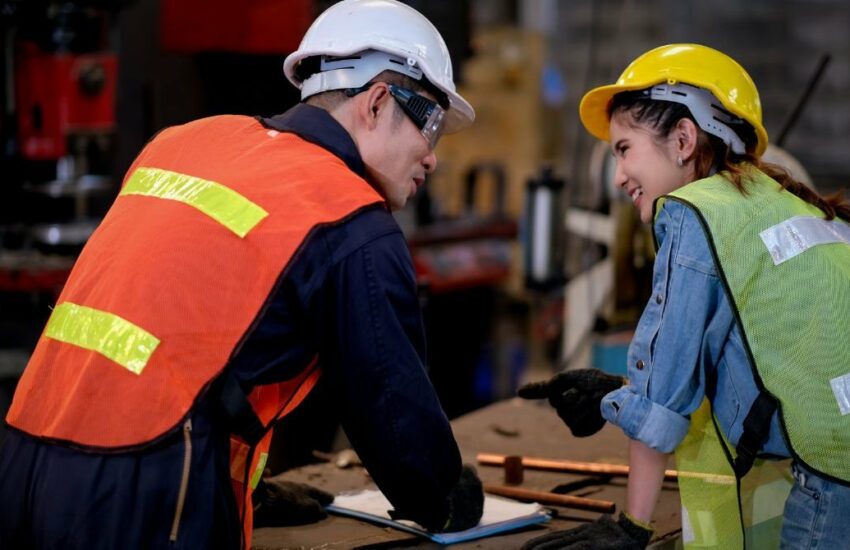We’re seeking for hardworking and dependable Factory Production Workers to join our creative factory team in Lindsay, Ontario. There are immediate full-time openings available. Factory Production Workers will produce metal parts in a fast-paced factory environment.
Candidates must be able to commit to at least six months of full-time, year-round work. We offer:
Weekly pay starts at $16.00 per hour.
Benefits are given to all workers after three months.
Opportunities for advancement and permanent employment
We offer comprehensive training and 24/7 staff support.
Factory Production Worker Duties:
Use a variety of tools, instruments, and general assembly procedures to meet production targets.
Machine operation and basic maintenance.
Quality assurance and equipment checks to uncover flaws.
Some warehouse cleaning chores, guaranteeing a clean and safe working environment.
Factory Production Worker Requirements:
Must be able to work full time. Day shifts
Looking for long-term job, at six months or one year.
Must have steel-toed boots.
Manual dexterity and the capacity to lift up to 40 pounds may be necessary.
Excellent punctuality and attendance.
Excellent attention to detail.
Other employers can call this position:
Job titles include Factory Labourer, Production Worker, Production Associate, Manufacturing Laborer, Industrial Labourer, and Factory Associate.
Begin earning a salary this week. Please submit your “Factory Production Worker – Lindsay” resume in Microsoft Word format.
What skills and attributes are essential for a factory worker?
Being a successful factory worker necessitates a combination of technical skills, physical attributes, and personal characteristics. Here are some essential abilities and attributes for a factory worker:
Technical Skills: Factory workers should have specialized technical skills that are appropriate for the sort of factory they work in. This can include operating machinery, comprehending assembly procedures, adhering to production instructions, and using tools or equipment. Knowledge of industry-specific processes and equipment is critical for efficient and safe manufacturing.
Physical stamina and strength: Factory employment frequently involves physical labor that requires endurance, strength, and the ability to stand for long periods of time. Factory workers may have to lift big goods, complete repetitive activities, and work in physically demanding environments. Excellent physical stamina and fitness are required.
Attention to Detail: Factory workers must pay close attention to detail in order to produce accurate and high-quality work. This includes carefully following instructions, checking produced products for flaws, and adhering to quality control guidelines. Attention to detail helps to avoid mistakes, decrease waste, and preserve manufacturing efficiency.
Hand-Eye Coordination: Many factory operations demand exceptional hand-eye coordination in order to perform exact movements, handle small parts, and operate machines correctly. Hand-eye coordination is useful for jobs such as assembly, packaging, and controlling control panels.
Technical and mechanical aptitude: Factory workers benefit from a natural ability to understand technical or mechanical topics. This involves the ability to troubleshoot simple equipment difficulties, make modest modifications, and understand machinery performance.
While formal education is not usually required for entry-level plant Worker roles, some certifications or training programs may be useful depending on the industry or kind of plant. Furthermore, having an optimistic attitude, a willingness to learn, and a strong work ethic are important attributes for success as a factory worker.
What education and certification are needed to become a factory worker?
The education and certification requirements for becoming a Factory Worker differ depending on the industry, kind of factory, and employer preferences. In many circumstances, formal education beyond a high school diploma or equivalent may not be necessary.
However, certain certifications or training programs can help you get a better career and learn new skills. Here are a few relevant options:
High school diploma or equivalent is usually the minimal educational qualification for entry-level Factory Worker roles. It reflects basic educational achievement and foundational skills.
On-the-Job Training: Many firms offer on-the-job training to factory workers. This training covers specialized jobs, methods, and safety measures for the factory’s manufacturing processes. On-the-job training allows people to obtain real skills and information right in the factory.
Industry-Specific Training Programs: Some sectors provide specialized training programs or apprenticeships for factory workers. These programs are designed to help students develop the skills and knowledge required for their respective industries or manufacturing processes. They may discuss machine operation, assembly processes, quality control, and workplace safety.
Technical or Vocational Education: While not usually essential, completing technical or vocational education programs in manufacturing or industrial operations can provide a solid base of knowledge and abilities. These programs may include courses in machine operation, industrial technology, manufacturing procedures, and quality assurance.
Forklift Operator Certification: If your factory uses forklifts or other material handling equipment, obtaining a forklift operator certification could be advantageous. This certification demonstrates expertise in operating forklifts safely and in accordance with applicable legislation.
It is crucial to remember that specific standards can vary greatly based on the business and employer preferences. Some factories may have specialized training programs or certifications for their operations.
Furthermore, many businesses may have legislation or safety standards that require personnel to undergo specific training or obtain applicable certificates.
